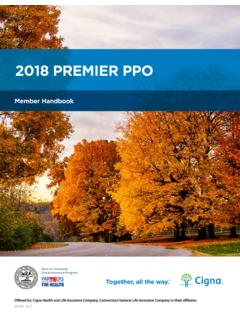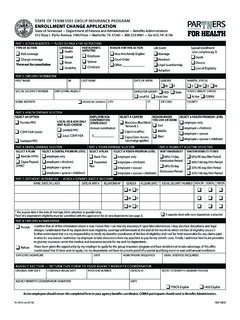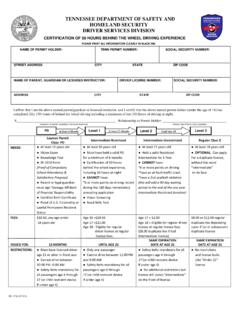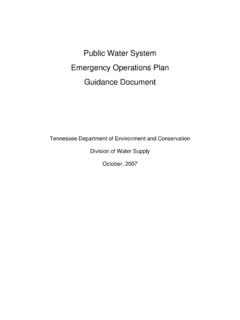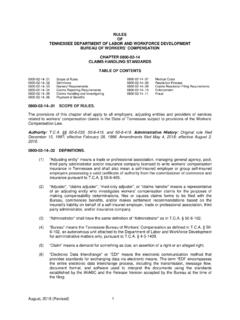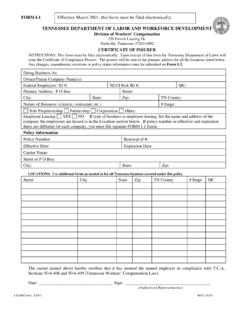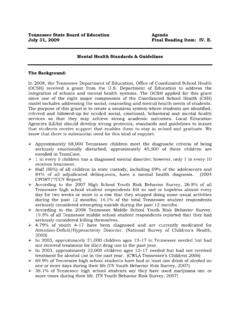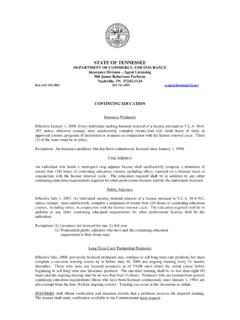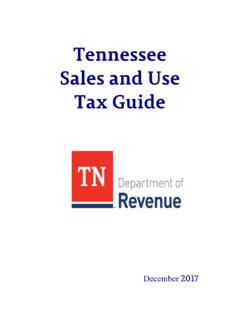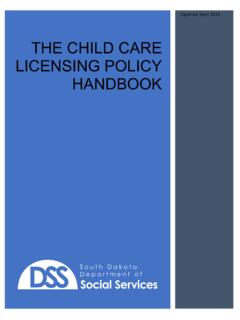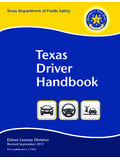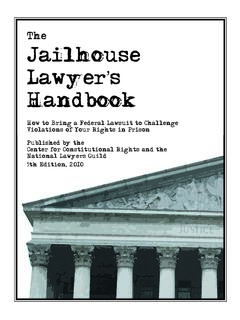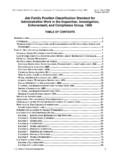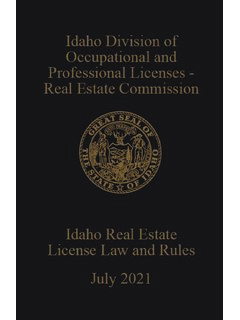Transcription of HANDBOOK FOR EMPLOYERS - Tennessee
1 State of Tennessee Department of Labor and Workforce Development Division of Employment Security HANDBOOK FOR EMPLOYERS June 13, 2019 This HANDBOOK has been prepared to provide a simplified explanation of the premium and benefit provisions of the Tennessee Employment Security Law and does not take precedence over the law or regulations. The TN Department of Labor and Workforce Development is committed to principles of equal opportunity, equal access, and affirmative action. Auxiliary aids and services are available upon request to individuals with disabilities. Table of Contents FOREWORD INTRODUCTION PRIVACY ACT STATEMENT SOCIAL SECURITY NUMBER DIRECTORY DEFINITIONS EMPLOYER ACCOUNTS PROVISIONS APPLYING FOR AN EMPLOYER ACCOUNT NUMBER (Rule ) LIABILITY Date of Liability (Rule ) Who Is Liable ( Section 50-7-205) Mergers and Successorships ( Section 50-7-403(b)(2)) Definition of Successor Notification of Change in Ownership Required Mandatory Transfer of Experience (Section 50-7-403(b)(2)(C) and (D)) Other Successors Application for Transfer of Experience Rating Record Common Paymaster ( Section 50-7-206(d)) Terminations and Inactive Accounts ( Section 50-7-405)
2 PROFESSIONAL EMPLOYER ORGANIZATIONS (Section 62-43-109(a) of the Tennessee Professional Employer Organization Act) Aggregate State Numbers and Client Account Numbers (Section 62-43-109(c)(1) of the Tennessee Professional Employer Organization Act) Wage and Premium Reports for Professional Employer Organizations and Their Clients Professional Employer Organizations and Their Clients Are Normally Not Successor EMPLOYERS ( Section 50- 7-403(b)(2)(K)) Professional Employer Organization Experience Rating and Aggregate Reserve Ratios New Employer Premium Rates for Professional Employer Organizations Aggregate State Numbers Joint and Several Liability between Professional Employer Organization and Client SUTA DUMPING1 ( Section 50-7-403(b)(2)) Explanation Examples of SUTA Dumping Punishments and Penalties for SUTA Dumping Violations SUTA Dumping Detection WHO ARE EMPLOYEES?
3 Employee or Independent Contractor Inclusions ( Section 50-7-207(b)) Exclusions ( Section 50-7-207(c)) HAVING EMPLOYEES IN MORE THAN ONE STATE In Which State(s) is an Employer Liable? Things to Know When You Have Employees in More than One State PREMIUMS AND TAXES ( Sections 50-7-402 and 50-7-403) Taxable Wage Base Federal Unemployment Tax Act (FUTA) State Premiums ( Section 50-7-403) New Employer Premium Rates ( Section 50-7-403(b)(1)(B)) NAICS 2-Digit Industry Codes WAGES ( Section 50-7-213; Rule ) Definition Meals, Lodging and Clothing (Rule , Rule ) Tips ( Section 50-7-2l3(a)) Severance Pay (TCA Section 50-7-303(a)(12)) Sick Pay and Medical Expenses ( Section 50-7-213(d)) Gifts and Bonuses ( Section 50-7-213(a)) Deferred Compensation ( Section 50-7-213(a)) Cafeteria Plans ( Section 50-7-213(a)) Back Pay Awards ( Section 50-7-303(e)) EXPERIENCE RATING ( Section 50-7-403) How and When an Employer Qualifies for Experience Rating ( Section 50-7-403) How an Employer's Premium Rate is Computed ( Section 50-7-403(b)(1)) Notice of Employer Premium Rate Appealing Your Premium Rate ( Section 50-7-403(n))
4 REIMBURSING EMPLOYERS ( Section 50-7-403(h)) Reporting Wages Benefit Payments and Charges RECORD KEEPING AND AUDITS Record Keeping (Rule ) Audits of Employer Records ( Section 50-7-701; Rule ) WAGE AND PREMIUM REPORTS Filing (Rule ) Reporting Total Monthly Employment Reporting Wages (Rule ) Filing Wage and Premium Reports on the Internet (TNPAWS) Filing Wage and Premium Reports by Third Party Upload (TPU) Paying Premiums Electronically Extension of Time to File (Rule ) No Payroll Reports Underpayments and Overpayments Correcting Reports ( Section 50-7-404(f)) Claim for Adjustment or Refund Wage Report Claim for Adjustment or Refund ADDITIONAL CHARGES, PENALTIES AND ENFORCEMENT Interest Charges ( Section 50-7-404(a)) Penalty Charges ( Section 50-7-404(c)(3)) Assessments ( Section 50-7-404(c))
5 Liens ( Section 50-7-404(b)) Injunctions ( Section 50-7-404(d)) Revoking Corporate Charters and Dissolving Limited Liability Companies ( Section 50-7-404) POSTING OF NOTICES (Rule ) POINTS EMPLOYERS SHOULD REMEMBER REGARDING EMPLOYER ACCOUNTS PROVISIONS CHARGING OF EMPLOYER FOR BENEFITS ( Section 50-7-403(d)) Charges Noncharges Other Benefit Charges ( Section 50-7-304(b)(2)(B) and (D)) Separating Employer s Notice of Separation and Wage Request ( Section 50-7-304(b)(2)(C)) Statement of Benefit Charges SEPARATION NOTICES, EMPLOYER FILED CLAIMS SIDES State Information Data Exchange System SIDES E-Response BENEFIT ELIGIBILITY ( Sections 50-7-301, 50-7-302, 50-7-303(a)) Requirements Weekly Benefit Amount ( Section 50-7-301(b)) Maximum Benefit Amount and Duration of Benefits ( Section 50-7-301(d)) Deductible Earnings Allowance ( Section 50-7-301(c)(1)) Military Spouse BENEFIT DISQUALIFICATIONS Voluntary Quit ( Section 50-7-303(a)(1)) Incarceration ( Section 50-302(a)(4)(F)) Employer Drug Testing as Hiring Requirement (TCA Section 50-303 (a)(14))
6 Refusal to Seek or Accept Suitable Work ( Section 50-7-303(a)(3)) Suitable Work and Wage Requirement ( Section 50-7-303(a)(3) Labor Disputes ( Section 50-7-303(a)(4)) Wages in Lieu of Notice ( Section 50-7-303(a)(11)) and 50-7-303(b)(4)) Monetary Incentives to Voluntarily Separate from Employment ( Section 50-7-303(c)(1)) Workers Compensation ( Section 50-7-303(a)) Benefits from Another State ( Section 50-7-303(a)(6)) Vacation Pay ( Section 50-7-303(a)(9)) Retirement, Pensions, Social Security ( Section 50-7-303(a)(8) Training ( Section 50-7-302(a)(4)(B)) Professional Sports ( Section 50-7-302(b)(3)) Aliens ( Section 50-7-302(b)(4)) Educational Employees ( Section 50-7-302(b)(2)(b)(A)(B)(i)) APPEAL RIGHTS ( Section 50-7-304) (Rules 0800-11-01 through 0800-11-04) Agency Decision Appeal to Appeals Tribunal Request to Reopen an Appeal to the Appeals Tribunal Appeals to the Commissioner s Designee Petition for Judicial Review in Chancery Court Appeal to Court Benefit Payments, Overpayments and Charges During Appeals ( Section 50-7-304(b)(2)) MASS LAYOFFS (Rule ) PARTIAL UNEMPLOYMENT and EMPLOYER FILED PARTIAL CLAIMS Definition ( Section 50-7-211, Rule 0800-09-01) INTERSTATE CLAIMS (Rule ))
7 POINTS EMPLOYERS SHOULD REMEMBER REGARDING BENEFIT PROVISIONS FORMS OF INTEREST TO Tennessee EMPLOYERS Premium Forms Benefit Forms STATE POSTERS REQUIRED FOR Tennessee EMPLOYERS FOREWORD The United States Congress enacted the unemployment insurance laws during the Great Depression. The theory was then and remains true today that putting money into the hands of the unemployed helps the unemployed, his family, his community, his state and the nation as a whole. The idea is to replace about half of lost income so the unemployed can pay for necessities during short terms of unemployment. At the same time, goods and services continue to be bought and sold in the community, helping the local economy remain stable.
8 Other government programs, such as welfare and food stamps, are less strained since unemployment is, in effect, a prepaid insurance policy. An unemployed worker with some income is less likely to move to another community to find a job, so the workforce in the area remains stable. Most EMPLOYERS who have workers in Tennessee are liable to pay the state unemployment insurance premiums and the Federal Unemployment Tax (FUTA). State premiums are paid quarterly. The Tennessee Department of Labor and Workforce Development's Division of Employment Security designed this HANDBOOK to help EMPLOYERS understand the unemployment insurance system, to help make compliance with the unemployment insurance laws as simple as possible, and to help the employer benefit from the unemployment insurance system.
9 If you have any questions or need help you can also visit the Tennessee Department of Labor and Workforce Development website at: INTRODUCTION Unemployment insurance provides benefits to unemployed workers who have lost their jobs through no fault of their own. The Tennessee Department of Labor and Workforce Development's Division of Employment Security administers the unemployment insurance program in Tennessee . Unemployment insurance is a joint federal-state program. State laws must conform to certain standards in the Federal Unemployment Tax Act (FUTA) which is administered by the Department of Labor.
10 Each state is able to establish laws and regulations within the federal guidelines, which meet the state s own employment and unemployment needs. All state premiums go into the Tennessee Unemployment Compensation Trust Fund. The Trust Fund is funded entirely by the state premiums and is used solely to pay unemployment benefits to unemployed workers who have worked in Tennessee and lost their jobs through no fault of their own. All administrative costs of the Tennessee unemployment insurance program are paid by the federal government from FUTA taxes. The information in this HANDBOOK does not take precedence over law or regulations and is subject to change at any time as a result of law revisions, court rulings, the Attorney General s interpretations, new federal requirements and agency procedural changes.
